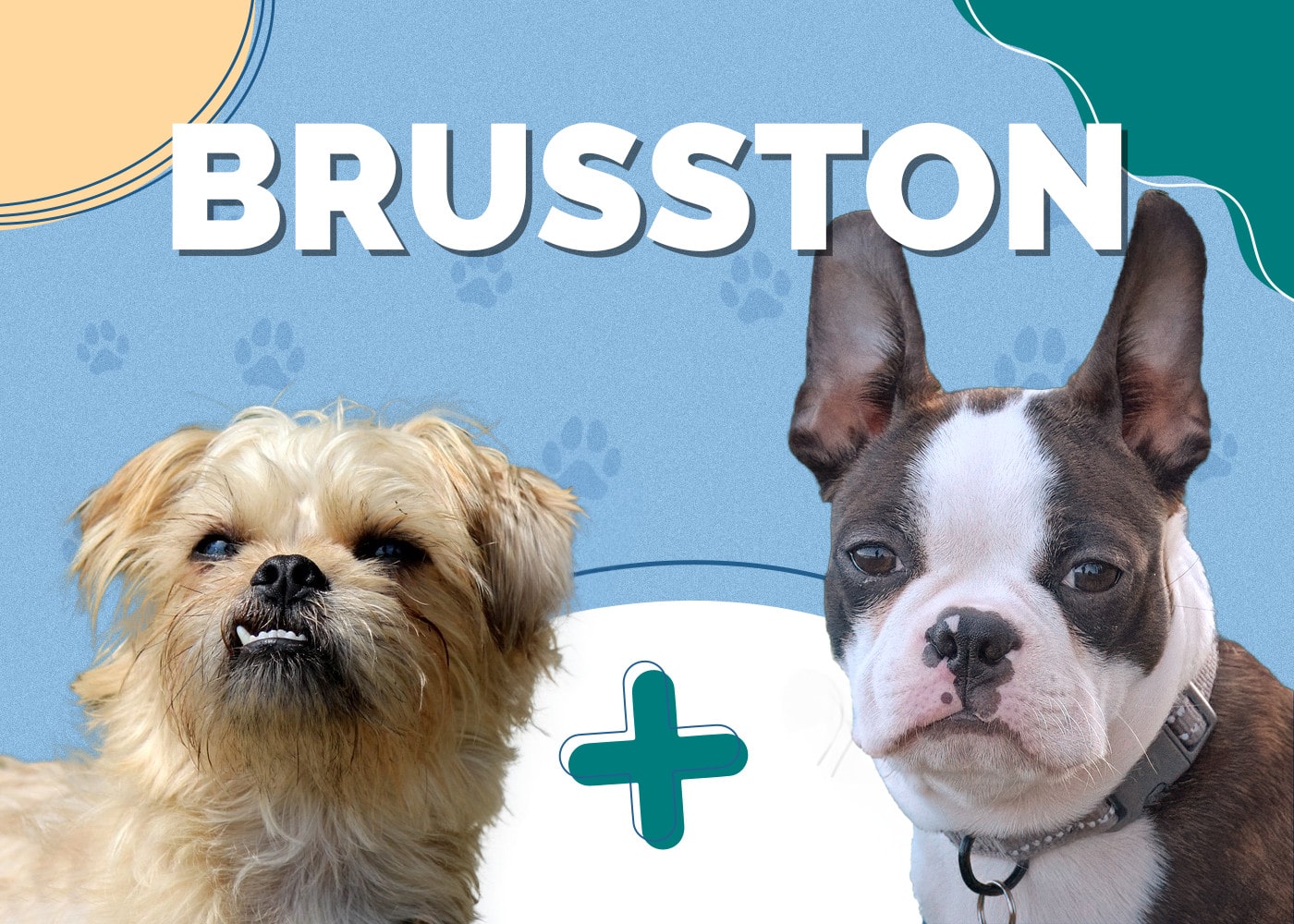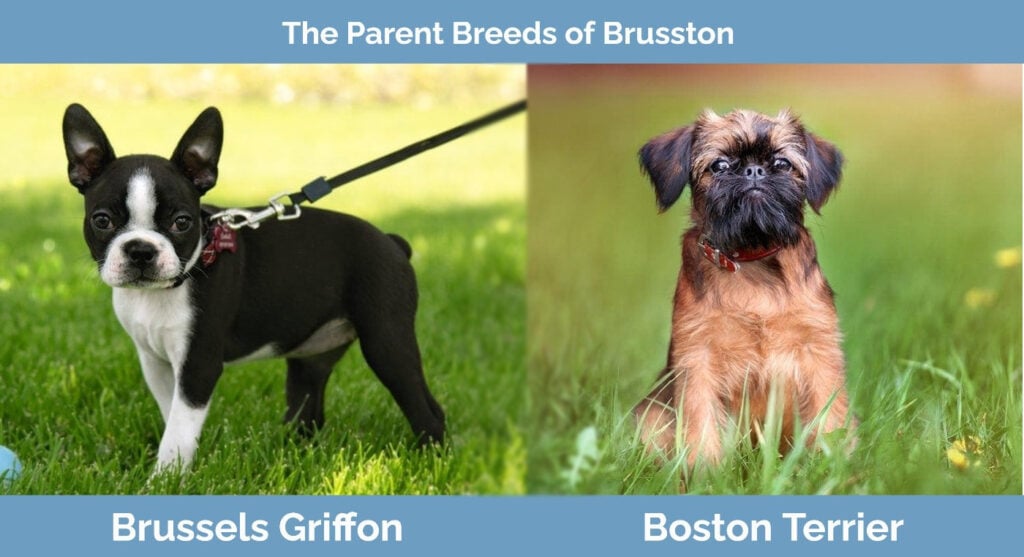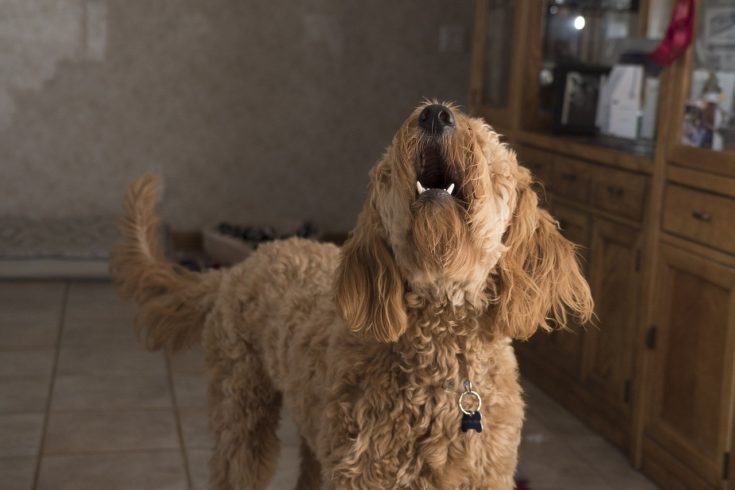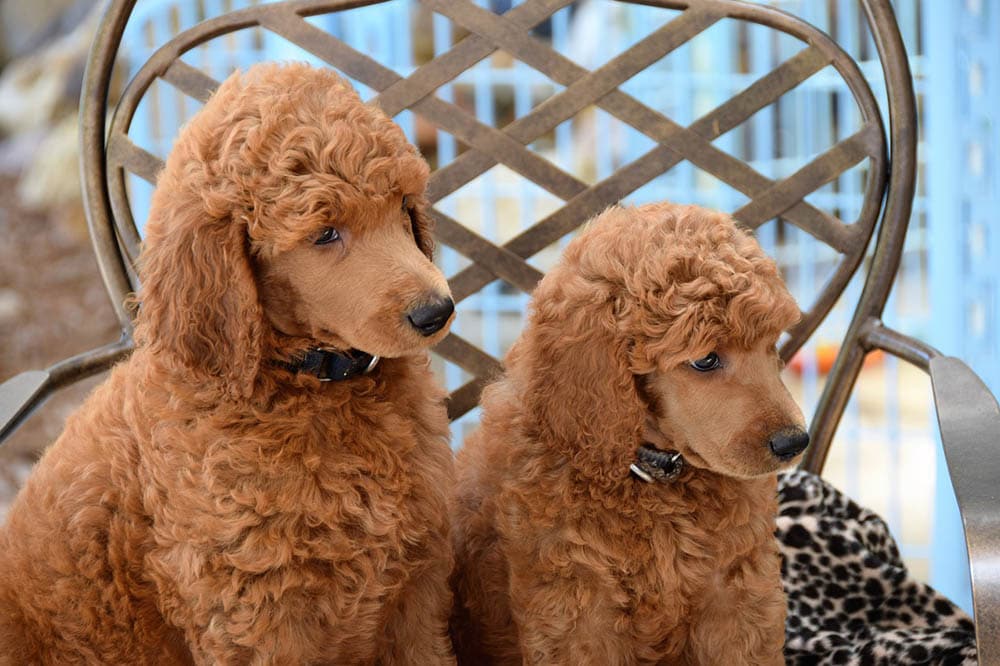Brusston (Brussels Griffon & Boston Terrier Mix): Info, Pictures, Traits

Updated on

| Height: | 10–17 inches |
| Weight: | 10–25 pounds |
| Lifespan: | 12–15 years |
| Colors: | Black, white, brown, tan, any combination of these colors |
| Suitable for: | Individuals and families without young kids, apartment dwellers, anyone who wants a lifelong companion |
| Temperament: | Energetic, friendly, alert, loving, loyal, jovial, alert, mischievous |
A relatively new breed, the Brusston is a cross between the “American Gentleman” Boston Terrier and the Brussels Griffon. The result is a small dog with a massive personality. They often, though not always, have markings and colorations similar to a Boston Terrier with the longer, wiry hair of a Brussels Griffon.
Likewise, their personalities tend to be a blend of the two breeds. From the Brussels Griffon side of the gene pool, Brusstons get their alertness, toughness, and their mischievous side. Brussels Griffons were hardy little dogs used to hunt rats on farms, so they are energetic, athletic, and alert.
Boston Terriers, on the other hand, are fun little pups with a hilarious side. Their goofy antics will keep you laughing and help make them excellent companions. Combined with the traits of the Brussels Griffon, you get an alert, intelligent dog with a comical streak that will keep you entertained and a mischievous side that tends to get into trouble!
Brussels Griffon Boston Terrier Mix Puppies
Because the Brusston is a relatively new breed, it’s hard to find these dogs easily. They’re not recognized by the AKC or any other major governing body, so you might expect Brusston puppies to be pretty affordable. However, both parents are recognized by the AKC. This makes them considerably more valuable as they’re pedigreed and accepted for showing. You can also stop by your local shelter and ask for Boston Terrier mixes. You might be able to find a dog mix that resembles the Brussels Griffon Boston Terrier and you’ll be changing a dog’s life at the same time.
When you bring one of these pups home, be ready to have a loyal and affectionate dog by your side. They also have a mischievous side to their personality. Overall, they’re fun dogs due to their playful and jovial temperament.
3 Little-Known Facts About the Brussels Griffon Boston Terrier Mix
1. They’ve been known to get in trouble.
The Brussels Griffon is known for being a mischievous dog; a trait that gets passed down directly to their Brusston offspring. These dogs are curious and bold, which often leads them to get into trouble! They get into things, explore, and sometimes end up where they shouldn’t.
If you’re going to add a Brusston to your family, you’ll want to make sure to keep a close eye on it, so it doesn’t wander into a troublesome situation and need to be rescued!
2. They’re rather quiet pets.
Brusstons might bark occasionally, but for the most part, they’re not very noisy pets. They don’t go off on loud barking sprees waking up the neighbors. The most you’re likely to hear from your Brusston is a few barks to alert you when someone is at the door.
3. Both parents have a long history.
Brusstons may not be accepted by governing bodies like the AKC, but both parent breeds are and have been for quite some time. In fact, both the Brussels Griffon and the Boston Terrier are among some of the oldest recognized breeds by the AKC.
The AKC was originally founded in 1884. Just 9 years later, in 1893, the Boston Terrier was recognized. A short time later in 1910, the Brussels Griffon was also recognized.

Brussels Griffon Boston Terrier Mix Temperament & Intelligence 🧠
It’s difficult to predict exactly how your Brusston will turn out since the breed isn’t well established yet and no norms have been set. However, you can usually bank on your Brusston having a personality that combines the strongest parts of each parent breed’s personalities.
Brusstons get their mischievous side from the Brussels Griffon. Also, from this side of the genetic tree, they get their toughness, boldness, and spirit. Brussels Griffons are a bit feisty and spirited, two traits that get passed down to the Brusston.
On the other side of the equation, the Boston Terrier has a very different temperament. These dogs are much calmer and less spunky than Brussels Griffons. They’re also comical, loving to spend time playing around and showing off their goofy antics. They make great apartment pets since they have low physical activity needs and are generally easy-going and friendly dogs.
The Brusston combines these two sets of personality traits. What you’re likely to get is a generally calm dog that’s playful and loving. But expect them to have a penchant for getting into trouble! Your Brusston might like to explore and seek out mischief, often letting their toughness get the better of them and ending up in hilarious situations! But the Terrier side will help to temper the trouble and ensure that Brusstons make excellent companions, house pets, and even do very well as apartment dogs.
Are These Dogs Good for Families? 🏡
Brusstons can make good family pets, but they do best in families without any little ones. Their calm but spirited demeanor makes them equally suited for lounging on the couch or playing around and having some fun with a game of fetch or tug-of-war.
But they don’t do so well with loud noises and overly rambunctious behavior, which may stress the dog. Young, rowdy kids aren’t a great fit for this breed. Not only will the dog not respond well to a child’s wild antics, but their small size also means that a child can accidentally hurt the dog.
Does This Breed Get Along with Other Pets? 🐶 😽
Brusstons can do well with other pets. However, you’ll need to take care to socialize your puppy often, starting at a young age. Remember, the Brussels Griffon was used to hunt rats on farms, and that prey drive is still in the Brusston’s genes. If you don’t socialize your Brusston early and often enough, the prey drive might take over, making it difficult to keep your dog in a household with other pets.
Things to Know When Owning a Brussels Griffon Boston Terrier Mix:
Food & Diet Requirements 🦴
Brusstons are very small dogs, topping out at about 25 pounds. As such, they don’t need much food. Your Brusston will likely eat around one cup of dry dog food each day.
This breed does well on high-quality dry commercial dog food. You just have to be careful not to overfeed them. Because of their small size, Brusstons are very susceptible to overfeeding and becoming overweight. Eventually, this can lead to obesity, drastically reducing your pet’s quality of life.
Exercise 🐕
This breed has moderate levels of energy. They’re not overly energetic, but they’re also not slouches who want to spend the whole day relaxing. You’ll want to invest 30–60 minutes each day into exercising your Brusston.
This is best done in several small intervals of 10–20 minutes. Brisk walks work well, but so does some structured playtime. As long as you keep your Brusston active, any type of physical activity will suffice.
Training 🦮
Brusstons are relatively easy to train. They want to please their owners and they’re smart enough to understand what’s being asked of them. As long as you use positive reinforcement and a firm hand, you should have little trouble getting your Brusston to learn obedience commands, tricks, and more. They’re even suitable for people who don’t have any previous experience with dog training.
Grooming ✂️
One big plus with this breed is that they don’t shed much. This makes them low-maintenance and easy with upkeep. Brushing your Brusston a couple of times each week is all that’s necessary. Bathing is only necessary once every few months if you start to notice any odors coming from your dog. Just remember to keep their nails trimmed and their ears clean and your Brusston will be easy to maintain.
Health Conditions ❤️
One reason for the growing popularity of designer dog breeds like the Brusston is that they’re thought to be healthier than purebred dogs. Pure breeds have developed susceptibilities to health concerns with some breeds being vulnerable to a wide range of diseases and other health issues. By crossing two breeds without the same concerns, it’s believed that you can reduce the chances of the offspring developing those conditions.
Unfortunately for Brusstons, they’re susceptible to quite a number of health concerns. Luckily, most of them are minor, but you should still keep an eye open for the following conditions in case they develop.
Patellar Luxation: The term for a kneecap that is able to move out of its normal position. This can cause your dog to “skip” or run on just three legs. In half of dogs with this condition, both knees will be affected.
Demodicosis: This is a parasitic skin condition that is caused by the Demodex Canis mite. This mite is present on all dogs but only becomes a problem when the dog’s immune system becomes compromised, which can lead to demodectic mange.
Progressive Retinal Atrophy: This is a degeneration of the retinal photoreceptor cells that eventually leads to blindness.
Cataracts: An opaque, cloudy covering of your dog’s eye lens. It can cause blindness if left untreated.
Glaucoma: An eye condition that causes intraocular pressure to increase. This can cause damage to the retina and optic nerve, resulting in pain, discharge, and even blindness.
Hydrocephalus: This is the name for a condition where an excess of cerebrospinal fluid has caused the brain to swell after leaking inside the skull. It can lead to brain damage and even death if left untreated.
Atopic Dermatitis: An allergic reaction that causes the dog to have itchy skin, making them bite, scratch, and lick.
Brachycephalic Syndrome: This affects dogs with a squished, flattened face and short snouts, such as the Boston Terrier. It may not result in any concerns, or it might be severe enough to block airways or cause other physical problems.
Male vs. Female
This is one breed where the males and females can be difficult to tell apart. For starters, they’re the same size! With most breeds, males tend to be a bit larger than females, but that’s not the case with the Brusston. This breed doesn’t even seem to exhibit noticeable temperamental differences between sexes.
Final Thoughts
Brusstons make entertaining companions. They’re great for individuals and families, as long as there aren’t any young children in the household. These dogs are loving, friendly, and playful. They’ll keep you entertained with their hilarious antics, but you’ll need to keep an eye out for their mischievous side that often leads to trouble!
Relatively low maintenance with minimal shedding and very little upkeep, Brusstons are great for households of all types. They do well in homes with yards or apartments with none. Just make sure to provide 30–60 minutes of exercise each day and your Brusston will make an excellent sidekick for life.
Featured Image Credits: Left – Boston Terrier (Eve-Photography, Shutterstock); Right – Brussels Griffon (Liliya Kulianionak, Pixabay)














